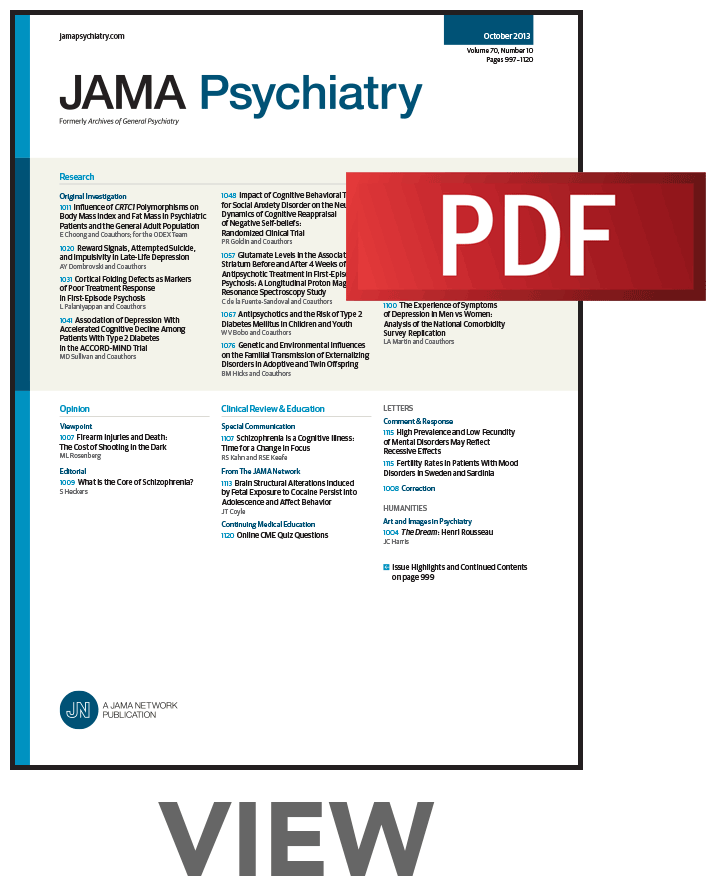Collaborative Care for Opioid Use Disorder in Primary Care
IF 17.1
1区 医学
Q1 PSYCHIATRY
引用次数: 0
Abstract
ImportanceThe criterion-standard treatment for opioid use disorder (OUD) is medications for OUD (MOUD). However, less than a quarter of people with OUD receive MOUD. The collaborative care model (CCM) is an evidence-based practice that integrates mental and physical health treatment in primary care settings. Expanding CCM to include patients with OUD could improve MOUD initiation.ObjectiveTo compare the effectiveness of CCM for OUD and co-occurring mental health symptoms (intervention) with CCM for mental health symptoms only (active control).Design, Setting, and ParticipantsThis hybrid type 2a trial cluster-randomized 24 US primary care clinics to intervention or control. Participants included patients with OUD and mental health symptoms who were not receiving specialty mental health care or specialty substance use treatment. Study data were analyzed from February 2024 to January 2025.InterventionsThe control care team included primary care practitioners, care managers, and psychiatric consultants. Primary care practitioners prescribed psychotropic medications with psychiatric consultation. Care manager activities included patient education, engagement and self-management, shared decision-making, measurement-based care for mental health symptoms, and brief psychotherapy for mental health. The intervention had the same components as the control, with additional MOUD training and psychiatric consultation for primary care practitioners, measurement-based care for OUD, and brief psychotherapy for OUD.Main Outcomes and MeasuresParticipants completed research assessments at baseline, 3 months, and 6 months. The multiple primary outcomes were past-month number of days of using opioids and the Veterans RAND 12 Mental Health Component Summary score.ResultsA total of 254 patients (mean [SD] age, 40.9 [12.4] years; 139 women [59.9%]) participated in the trial. Most participants (172 of 212 [81.1%]) were taking MOUD at baseline. Days using opioids decreased in both the control and intervention groups. The intervention significantly reduced opioid use more than the control with a medium effect size (adjusted ratio of odds ratio, 0.10; 95% CI, 0.03-0.38; Cohen初级保健中阿片类药物使用障碍的协同护理
重要性阿片类药物使用障碍(OUD)的标准治疗是药物治疗(OUD)。然而,只有不到四分之一的OUD患者接受了mod治疗。协作护理模式(CCM)是一种基于证据的实践,在初级保健机构中整合了精神和身体健康治疗。扩大CCM以包括OUD患者可以改善mod的发生。目的比较CCM治疗OUD伴发精神健康症状(干预)与仅治疗精神健康症状(主动对照)的疗效。设计、环境和参与者这项2a型混合试验将24家美国初级保健诊所随机分为干预组和对照组。参与者包括患有OUD和精神健康症状的患者,他们没有接受专业精神卫生保健或专业物质使用治疗。研究数据分析时间为2024年2月至2025年1月。干预措施对照组包括初级保健医生、护理管理人员和精神科顾问。初级保健医生在精神病会诊的情况下开精神药物。护理管理人员的活动包括患者教育、参与和自我管理、共同决策、基于测量的心理健康症状护理和简短的心理健康心理治疗。干预具有与对照组相同的组成部分,包括额外的OUD培训和初级保健从业人员的精神咨询,对OUD的基于测量的护理,以及对OUD的简短心理治疗。受试者在基线、3个月和6个月时完成了研究评估。多个主要结果是过去一个月使用阿片类药物的天数和退伍军人RAND 12心理健康成分总结评分。结果共纳入254例患者(平均[SD]年龄40.9[12.4]岁,女性139例[59.9%])。大多数参与者(212人中有172人[81.1%])在基线时服用mod。对照组和干预组使用阿片类药物的天数均有所减少。干预显著减少了阿片类药物的使用,效果中等(校正比值比0.10;95% CI, 0.03-0.38; Cohen d = - 0.44; P < .001)。心理健康成分总结得分在对照组和干预组均略有改善。与对照组相比,干预没有显著提高得分(调整后的变化差异为- 1.20;95% CI, - 4.97至2.57;Cohen d = - 0.09; P = 0.53)。本集群随机临床试验的结果表明,在初级保健中采用CCM可以成功地管理OUD,特别是针对OUD和心理健康症状的CCM。有OUD处方者的初级保健诊所应考虑对OUD和心理健康实施CCM。临床试验注册号:NCT04600414
本文章由计算机程序翻译,如有差异,请以英文原文为准。
求助全文
约1分钟内获得全文
求助全文
来源期刊

JAMA Psychiatry
PSYCHIATRY-
CiteScore
30.60
自引率
1.90%
发文量
233
期刊介绍:
JAMA Psychiatry is a global, peer-reviewed journal catering to clinicians, scholars, and research scientists in psychiatry, mental health, behavioral science, and related fields. The Archives of Neurology & Psychiatry originated in 1919, splitting into two journals in 1959: Archives of Neurology and Archives of General Psychiatry. In 2013, these evolved into JAMA Neurology and JAMA Psychiatry, respectively. JAMA Psychiatry is affiliated with the JAMA Network, a group of peer-reviewed medical and specialty publications.
 求助内容:
求助内容: 应助结果提醒方式:
应助结果提醒方式:


